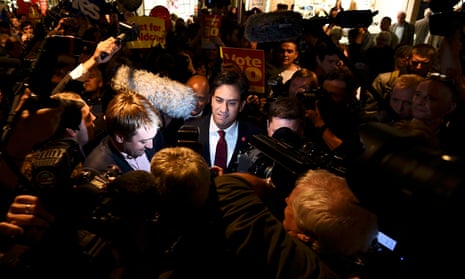A slogan should gnaw at the conscience of every delegate of the “people’s party” as they throng to Manchester this week: “Vote no, it’s not worth the risk.” Here was one of the Labour party’s final offerings to the people of Scotland in the climax of the independence referendum. No call for the resurrection of the proud, shared traditions of Scots, Welsh and English people as they defied the powerful to build a better society; no convincing pledge that a new Britain would be forged, just and equal and fair unlike what New Labour failed to deliver. Instead, the hollowed-out husk that is Scottish Labour linked arms with a Tory party consigned by Scots to fringe status, and cheered on corporate titans as they threatened to hit livelihoods or pull the plug on the economy.
“Not worth the risk.” It is a familiar sentiment, traditionally expressed by elites who oppose any attempt at the most modest of social reforms. “Please don’t hit our booming bank accounts” is not a convincing pitch in a democracy, after all, so a concern for the wellbeing of the population is contrived instead. In the past, Labour defied such disingenuous scaremongering and took risks: building a National Health Service, a welfare state, and granting working people rights and dignity. Each time, the well-heeled squealed that the walls would cave in, but the house remained intact.
Any criticism of Labour’s direction – particularly during a conference kickstarting its general election campaign – is met with the response that it only helps the Tories. Keep stumm, stand behind the only chance of booting out this government. In the aftermath of Scotland, such advice is suicidal. Hundreds of thousands of Scottish Labour voters are so disillusioned that they just voted to set up a new country. It is working-class, traditionally Labour communities who ensured the near-triumph of Scottish independence. Such disillusionment is expressed in different ways south of the border, but it is no less powerful. Labour’s support base is becoming ever softer, waiting to be scooped away.
Labour’s annual conference is as unreal a place as anywhere in the pantomime of modern British politics. There is no shortage of well-intentioned and principled activists. But the people who Labour was set up to represent are mostly shut out, except perhaps for the catering staff, bartenders and hotel cleaners. Political climbers speak in verbless sentences, stare over shoulders for someone more useful to speak to and – you suspect – wet their fingers to see which way the political winds are blowing. Trade unions and strong local government once trained up those who would have otherwise been voiceless to become rooted politicians, giving them resources, confidence and political know-how. As both pillars of British democracy have been ruthlessly undermined, many of those voices have been extinguished.
British politics, and much of Labour, has become a sport, a professional ladder to climb like any investment bank, even if the top salary only puts you in the top 3% of earners rather than the top 0.01%. You can always use a future ministerial position as a launchpad for a lucrative job at a private healthcare firm or defence giant anyway.
But this is why the Labour conference feels so unreal. Britain is an extraordinarily rich country. Here’s the proof. In the last five years of the most protracted economic crisis since the 19th century, the wealth of the richest 1,000 people has more than doubled. That surge in wealth – of about £261bn – is worth about two and a half times Britain’s annual deficit. Tot up their fortunes and you come up with the sum of £519bn, or about a third of Britain’s annual GDP. And yet in the sixth biggest economy on earth nearly 1 million people have been driven to food banks to feed themselves. The Red Cross has distributed food packages to British families for the first time since the second world war. Perhaps there is something about these facts that has failed to puncture our consciousness, so it is worth stating them succinctly. In Britain, in 2014, hundreds of thousands of people can no longer afford to feed themselves.
Only a sociopath would design such a society from scratch, and yet our political elite maintains and defends this grotesque order and portrays the dissenters as the real cranks and extremists. And that’s why, perhaps, a Labour conference of fringe meetings presided over by chin-stroking pundits (yes, like me) and ambitious shadow ministers warning of “tough decisions” (tough for whom, exactly?) seems rather perverse. The sense that Britain is a fundamentally broken society – where wealth and power is vacuumed up by a shameless rich elite while Victorian-style squalor re-emerges – and needs to be transformed: well, it’s just not there.
Take Ed Miliband’s commitment to a minimum wage of £8 an hour by 2020. Perhaps a writer like me is supposed to lap it up as red meat, a clear dividing line with a Tory party that has plunged over a million workers into poverty pay. Well, tough. This commitment is derisory. After six years of inflation, it is estimated that such a promise represents a rise of 2.2% a year. In 2020, millions of workers will still toil and sweat for their poverty. Cleaners will still sit on night buses at five in the morning as they commute to work for millionaires who earn more in a day than they do in a year, and pay a smaller proportion of tax. Only by the state continuing to shell out billions of pounds subsidising poverty-paying bosses will these workers expect to be able to scrape a half-decent existence.
Labour pledges to build 200,000 homes a year by 2020, even though we would have to build 250,000 a year now just to meet need. One in four children in booming London – a playground for hedge fund managers and Russian oligarchs – live in overcrowded homes, damaging their educational prospects, their health, their wellbeing. But where is the decisive commitment to build a new generation of top-quality council housing, enabled by the lifting of local authority borrowing limits? A welcome energy bill freeze is promised, even though most voters – including Tory and Ukip supporters – prefer public ownership of energy. An incomprehensible policy on our fragmented, rip-off, publicly subsidised privatised railway is offered, even though a clear-cut commitment to renationalisation is backed by a large majority. And so on.
But here is the counterblast. Oh, you can pick and choose support for radical policies from opinion polls all right, but any politician who advocates them will be crucified at the ballot box. Voters may like policies like a statutory living wage, public ownership or higher taxes on the rich, but they have no faith a politician will ever be capable of implementing them. And there is the rub. The worse politicians behave, the more they undermine faith in democracy as a vehicle for social change. People don’t take to the streets, they become resigned. They yell at politicians when they appear on television, but give up on holding them to account.
Compare Labour’s timidity to the Tories’ shamelessness. They lost an unlosable general election, and used it as a springboard for radical policies no one voted for, like privatising the NHS or cutting taxes on the rich. They span a crisis of the private sector – the City which bankrolls them – into an attack on the public sector. When they were enveloped by a lobbying scandal, they used it to draw up legislation to hammer trade unions and charities. Now they’re using Scotland’s near-fleeing from the union – partly driven by a desire to be ever free of the Tories – to rejig parliament in their favour and counterbalance their long-term decline.
And so it falls to the rest of us. Scotland’s yes campaign did not win, but it did mobilise the previously unheard and succeed in extracting promises from a bewildered political elite. There is now a fight to realise those promises, to be sure. But imagine a similar movement was mobilised, sweeping away political disillusionment and resignation, putting the screws on Labour’s leaders to offer meaningful change. It would point out that – in Spain and Greece – social democratic parties suffered or face oblivion at the hands of parties offering a radical break. There’s too much risk involved in genuinely transforming British society, Labour’s technocratic elite may preach. But it may well be that the real risk is maintaining a bankrupt social order that should have been swept away long ago.

